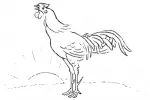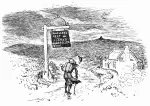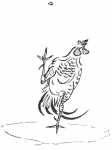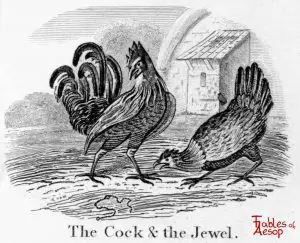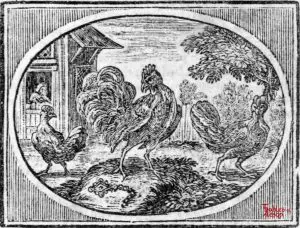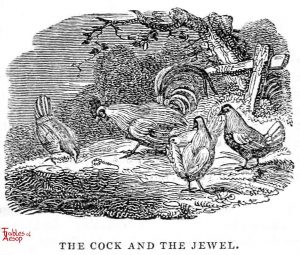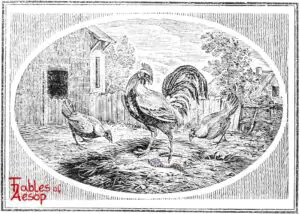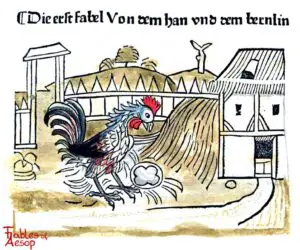A Cock (Rooster) looks for food but finds a jewel and throws it aside as unwanted.
Precious things are for those who prize them.

Eliot/Jacobs Version
A cock was once strutting up and down the farmyard among the hens when suddenly he espied something shinning amid the straw. “Ho! ho!” quoth he, “that’s for me,” and soon rooted it out from beneath the straw. What did it turn out to be but a Pearl that by some chance had been lost in the yard? “You may be a treasure,” quoth Master Cock, “to men that prize you, but for me I would rather have a single barley-corn than a peck of pearls.”

Caldecott
A Barn-door Cock while scratching up his dunghill came upon a Jewel. “Oh, why,” said he, “should I find this glistening thing? If some jeweller had found it he would have been beside himself with joy at the thought of its value; but to me it is of no manner of use, nor do I care one jot about it; why, I would rather have one grain of barley than all the jewels in the world.”

Aesop For Children
A Cock was busily scratching and scraping about to find something to eat for himself and his family, when he happened to turn up a precious jewel that had been lost by its owner.
“Aha!” said the Cock. “No doubt you are very costly and he who lost you would give a great deal to find you. But as for me, I would choose a single grain of barleycorn before all the jewels in the world.”
Moral
Precious things are without value to those who cannot prize them.

Jefferys Taylor
A COCK there was:—a sage was he
(If Aesop we may trust),
Who wish’d to make a meal, you see,
As other sages must.
With this intent, as heretofore,
When on the hunt for grain,
Our hero scratch’d the litter o’er
With all his might and main.
But scarce a minute had he scratch’d,
When, to his great surprise,
A gem, with golden chain attach’d,
He saw with both his eyes.
“Alack!” quoth he, “what have we here?
A diamond, I protest!
Which lords and ladies buy so dear,
And hold in such request.
“But one good barley-corn to me
Has more intrinsic worth
Than all the pearls now in the sea,
Or gold now in the earth.”
The moral here in Aesop’s mind
Was this, there’s not a doubt;
Things have most value which we find
We cannot do without.

Townsend version
A Cock, scratching for food for himself and his hens, found a precious stone and exclaimed: “If your owner had found thee, and not I, he would have taken thee up, and have set thee in thy first estate; but I have found thee for no purpose. I would rather have one barleycorn than all the jewels in the world.”
Moral
He that’s industrious in an honest calling, shall never fail of a blessing. It is the part of a wise man to prefer things necessary before matters of curiosity, ornament, or pleasure.

JBR Collection
A brisk young Cock scratching for something with which to entertain his favourite hens, happened to turn up a jewel. Feeling quite sure that it was something precious, but not knowing well what to do with it, he addressed it with an air of affected wisdom as follows:–“You are a very fine thing, no doubt, but you are not at all to my taste. For my part, I would rather have one grain of dear delicious barley than all the jewels in the world.”

Samuel Croxall
A BRISK young Cock, in company with two or three Pullets, his mistresses, raking upon a dunghill for something to entertain them with, happened to scratch up a jewel; he knew what it was well enough, for it sparkled with an exceeding bright lustre; but, not knowing what to do with it, endeavoured to cover his ignorance under a gay contempt. So, shrugging up his wings, shaking his head, and Cutting on a grimace, he expressed himself to this purpose: Indeed, you are a very fine thing; but I know not any business you have here. I make no scruple of declaring that my taste lies quite another way; and I had rather have one grain of dear delicious barley, than all the jewels under the sun.
THE APPLICATION
There are several people in the world, that pass, with some, for well-accomplished gentlemen, and very pretty fellows, though they are as great strangers to the true uses of virtue and knowledge, as the Cock upon the dunghill is to the real value of the jewel. He palliates his ignorance, by pretending that his taste lies another way: but whatever gallant airs people may give themselves upon these occasions, without dispute, the solid advantages of virtue, and the durable pleasures of learning, are as much to be preferred before other objects of the senses, as the finest brilliant diamond is above a barley-corn. The greatest blockheads would appear to under- stand, what at the same time they affect to despise; and nobody yet was ever so vicious,as to have the impudence to declare in public, that virtue was not a fine thing.
But still among the idle, sauntering young fellows of the age, who have leisure, as well to cultivate and improve the faculties of the mind, as to dress and embellish the body; how many are there, who spend their days in raking after new scenes of debauchery, in comparison of those few who know how to relish more reasonable entertainments! Honest, undesigning good sense is so unfashionable, that he must be a bold man, who at this time of day attempts to bring it into esteem.
How disappointed is the youth, who, in the midst of his amorous pursuits, endeavouring to plunder an outside of bloom and beauty, finds a treasure of impenetrable virtue concealed within! And why may it not be said, how delighted are the fair sex, when, from among a crowd of empty, frolicsome, conceited admirers, they find out and distinguish with their good opinion, a man of sense, with a plain, unaffected person, which, at first sight, they did not like.

Thomas Bewick
A gallant young Cock, in company with his mistresses, raking upon a dung-hill for something to entertain them with, happened to scratch up a Jewel. He knew what it was well enough, for it sparkled with an exceeding bright lustre; but not knowing what to do with it, he shrugged up his wings, shook his head, and putting on a grimace, expressed himself to this purpose: Indeed, you are a very fine thing; but I know not any business you have here. I make no scruple of declaring, that my taste lies quite another way; and I had rather have one grain of dear, delicious barley, than all the Jewels under the sun.
APPLICATION.
Moralists have interpreted this Fable in various ways, some of them ascribing the want of setting a proper value upon the Jewel, to ignorance, and say:–
"To fools, the treasures dug from wisdom's mine
"Are Jewels thrown to Cocks, and Pearls to Swine."
But the most obvious meaning of the Fable is surely to shew, that men who weigh well their own real wants, and shape their pursuits to their abilities, will always prefer those things which are necessary, to such as are merely ornamental or superfluous, and will not easily suffer themselves to be led astray by the gaudy allurements of glitter and show, which have no other value than what vanity, pride, or luxury may have set upon them; but governing their minds by their own reason, judge of every thing by its intrinsic worth.
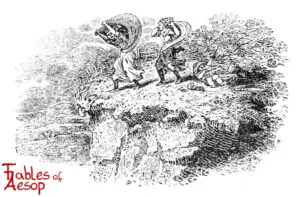

L’Estrange version
As a cock was turning up a dunghill, he spy’d a diamond. Well (says he to himself) this sparkling foolery now to a lapidary in my place, would have been the making of him; but as to any use or purpose of mine, a barley-corn had been worth forty on’t.
Moral
He that’s industrious in an honest calling, shall never fail of a blessing. ‘Tis the part of a wise man to prefer things necessary before matters of curiosity, ornament, or pleasure.

Crane Poetry Visual
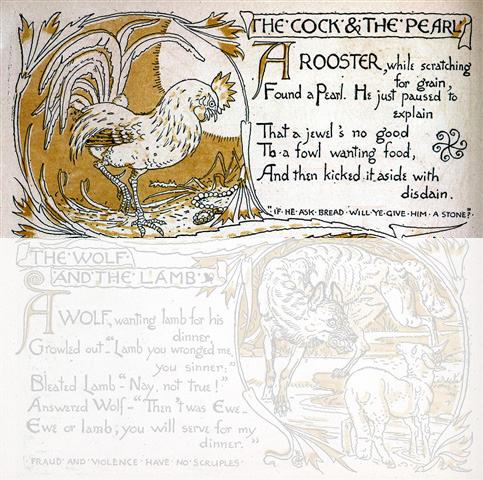
A Rooster, while scratching for grain,
Found a pearl. He just paused to explain
That a jewel’s no good
To a fowl wanting food,
And then kicked it aside with disdain.
If he asks bread, will ye give him a stone?

Heinrich Steinhöwel (Of the Rooster and the Pearl or Jasper)

Gallus et Gemma
Gallus gallinaceus, dum armato pede sterquilinium dissipando disiicit, invenit gemmam, “Quid,” inquiens, “rem tam fulgurantem reperio? Si gemmarius invenisset, laetabundus exsultaret, quippe qui scivit pretium. Mihi quidem nulli est usui nec magni aestimo. Unum etenim hordei granum est mihi longe pretiosius quam omnes gemmae, quamvis ad invidiam micent diei opprobriumque solis.”
Perry #503
